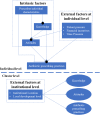Intrinsic and external determinants of antibiotic prescribing: a multi-level path analysis of primary care prescriptions in Hubei, China
- PMID: 31406571
- PMCID: PMC6686458
- DOI: 10.1186/s13756-019-0592-5
Intrinsic and external determinants of antibiotic prescribing: a multi-level path analysis of primary care prescriptions in Hubei, China
Abstract
Background: Irrational use of antibiotics is a major driver of development of antibiotic resistance, which heavily threatens population health worldwide. Understanding the mechanism of physician's antibiotic prescribing decisions is increasingly highlighted to promote prudent use of antibiotics. Therefore, the current study aimed to fill the gap, modelling physician's antibiotic prescribing and identifying the potential intrinsic and external determinants of antibiotic prescribing in primary care.
Methods: A total of 428,475 prescriptions from 499 prescribers in 65 primary care facilities in Hubei of China were audited. Teixeira Antibiotic Prescribing Behavioral Model (TAPBM) was referred as theoretical basis to identify intrinsic and external predictors of antibiotic prescriptions. A questionnaire survey was conducted, covering potential physician's intrinsic determinants (knowledge, attitudes and individual characteristics) and external factors both in individual level (patient pressure, time pressure and financial incentives) and institutional level (setting and local socio-economic development). A two-level path analysis was performed linking potential determinants of antibiotic use with physician's actual practices.
Results: About 44.28% of the prescriptions contained antibiotics, with 9.28% containing two or more antibiotics. The multi-level path analysis revealed that knowledge was a significant predictor of attitudes (β = 0.154, p < 0.05), but higher knowledge and attitudes failed to translate into antibiotic prescribing practices ((β = - 0.076 - 0.039, p > 0.05). Instead, external factors played a more important role and physician's antibiotic use was significantly associated with patient pressure (β = 0.102, p = 0.022), time pressure (β = - 0.164, p = 0.002), financial incentives (β = - 0.133- - 0.155, p = 0.027) and institutional environments (rural area, β = 0.408, p = 0.002; and high socioeconomic setting, β = - 0.641 - -0.578, p < 0.001 ). The prescribers who were male (β = - 0.168, p = 0.007) or had lower qualification (β = - 0.114, p = 0.028) were also more likely to prescribe antibiotics than others.
Conclusion: Antibiotic prescribing practices are complex process and associated with both intrinsic (prescriber) and external (patients and institutional environment) factors. A systematic approach is required to curb over-prescription of antibiotics. Apart from educating prescribers, it is equally important, if not more, to educate patients, break incentives and nurture professional culture within organization to reduce the overuse of antibiotics.
Keywords: Antibiotic prescribing; China; Knowledge-attitudes-practices; Path analysis; Primacy care.
Conflict of interest statement
Competing interestsThe authors declare no conflict of interest.
Figures


References
-
- WHO . Global action plan on antimicrobial resistance. Geneva, Switzerland: World Health Organization; 2015.
-
- Jim ON. Review on antimicrobial resistance antimicrobial resistance: tackling a crisis for the health and wealth of nations. London: Review on Antimicrobial Resistance; 2014.
Publication types
MeSH terms
Substances
LinkOut - more resources
Full Text Sources
Medical
Miscellaneous

